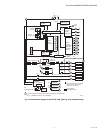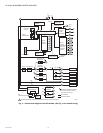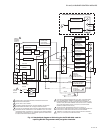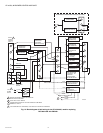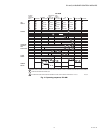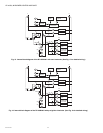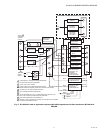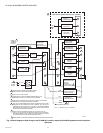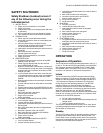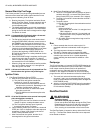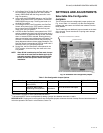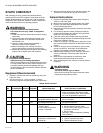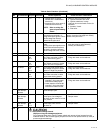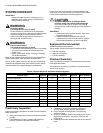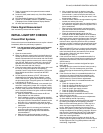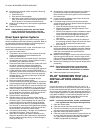R7140G,L,M BURNER CONTROL MODULES
23 66-1153—03
SAFETY SHUTDOWN
Safety Shutdown (Lockout) occurs if
any of the following occur during the
indicated period:
1. INITIATE Period:
a. Purge card is not installed or is removed.
b. Purge card is bad.
c. Configuration jumpers are changed (after 200 hours
of operation).
d. AC line power errors occur; see Operation section.
e. Four minute INITIATE period has been exceeded.
2. STANDBY Period:
a. Flame signal is present after 240 seconds.
b. Pre-Ignition Interlock is open an accumulative time
of 30 seconds.
c. Interlock check feature is enabled and the
Interlock String (including airflow switch) is closed
for 120 seconds with controller closed.
d. Ignition/pilot valve/intermittent pilot valve terminal is
energized.
e. Main valve terminal is energized.
f. Internal system fault occurs.
g. Purge card is not installed or is removed.
h. Purge card is bad.
3. PREPURGE Period:
a. Pre-Ignition Interlock opens anytime during PRE-
PURGE period (R7140L).
b. Flame signal is detected after first ten seconds
during PREPURGE (R7140L).
c. High Fire Switch fails to close within 4 minutes and
15 seconds after the firing rate motor is commanded
to drive to the high fire position at the start of PRE-
PURGE (R7140L).
d. Low Fire Switch fails to close within 4 minutes and
15 seconds after the firing rate motor is commanded
to drive to the low fire position at the end of PRE-
PURGE.
e. Running Interlock does not close within 30 seconds
(R7140G,M).
f. Lockout Interlock does not close within 10 seconds
(R7140L).
g. Lockout Interlock opens during PREPURGE (R7140L).
h. Ignition/pilot valve/intermittent pilot valve terminal is
energized.
i. Main valve terminal is energized.
j. Internal system fault occurs.
k. Purge card is removed.
l. Purge card is bad.
4. PILOT FLAME ESTABLISHING Period (PFEP):
a. Low Fire Switch opens.
b. Lockout Interlock opens (RM7140L).
c. Ignition/pilot valve/intermittent pilot valve terminal is
not energized.
d. Early spark termination terminal is energized after
five seconds.
e. No flame is present at the end of PFEP.
f. Main valve terminal is energized (R7140G,M).
g. Internal system fault occurs.
h. Purge card is removed.
i. Purge card is bad.
5. MAIN FLAME ESTABLISHING Period (MFEP):
a. Low Fire Switch Opens.
b. Lockout Interlock opens (R7140L).
c. Ignition/pilot valve/intermittent pilot valve terminal is
not energized.
d. Main valve terminal is not energized.
e. No flame is present at the end of MFEP.
f. Internal system fault occurs.
g. Purge card is removed.
h. Purge card is bad.
6. RUN Period:
a. No flame is present.
b. Lockout Interlock opens (R7140L).
c. Interrupted pilot valve terminal is energized
(R7140G,M).
d. Main valve terminal is not energized.
e. Internal system fault occurs.
f. Purge card is removed.
g. Purge card is bad.
7. POSTPURGE Period:
a. Pre-Ignition Interlock does not close in five seconds
and opens after five-second time period.
b. Ignition/pilot valve/intermittent pilot valve terminal is
energized.
c. Main valve terminal is energized.
d. Internal system fault occurs.
e. Purge card is removed.
f. Purge card is bad.
OPERATION
Sequence of Operation
The R7140 has the following operating sequences; see Fig. 4,
9, and 14. The R7140 LED provides positive visual indication
of the program sequence: POWER, PILOT, FLAME, MAIN
and ALARM. (Note: The Power LED is lit for 4 1/2 seconds
and off for 1/2 seconds, to indicate normal operation.)
Initiate
The R7140 enters the INITIATE sequence when the Relay
Module is powered. The R7140 can also enter the INITIATE
sequence if the Relay Module verifies voltage fluctuations of
+10/-15 percent or frequency fluctuations of ±10 percent
during any part of the operating sequence. The INITIATE
sequence lasts for ten seconds unless the voltage or
frequency tolerances are not met. When the tolerances are
not met, a hold condition is initiated for at least five seconds.
When the tolerances are met, the INITIATE sequence
restarts. If the condition is not corrected and the hold condition
exists for four minutes, the R7140 locks out. Causes for hold
conditions in the INITIATE sequence:
a. AC line dropout is detected.
b. AC line noise prevents a sufficient reading of the line
voltage inputs.
c. Low line voltage brownouts occur.
The INITIATE sequence also delays the burner motor starter
from being energized and de-energized from an intermittent
AC line input or control input.
Standby
The R7140 is ready to start an operating sequence when the
operating control determines a call for heat is present. The
burner switch, limits, operating control and all microcomputer
monitored circuits must be in the correct state for the R7140 to
continue into the PREPURGE sequence.



